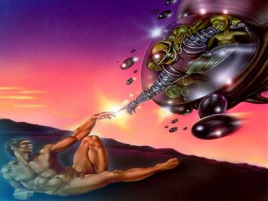Religion and Science: Finding Their Kindred Spirits
By Krista Tippett | Jun 25, 2010

The science-religion “debate” is an abstraction, and a distraction. It isn’t true to the deep nature of science, or of religion, or to the history of interplay between them. These are convictions I’m left with after a cumulative conversation that began a decade ago. And after spending the spring traveling around the country talking about this in theaters packed with scientists and citizens, atheist to devout, I know that others share my sense that our sound-bite friendly, politically-fueled narrative of animosity has outlived its usefulness. There is a science-religion divide — these are two distinct and separate spheres of endeavor. But in the 21st century, we can’t help but hear echoes passing back and forth across that divide and changing the way we understand our humanity, our relationship to each other and the natural world, the contours of the cosmos.
It’s not just the passion and frequency with which mathematicians talk about beauty and physicists talk about mystery that intrigues me. It is also that every time the rest of us log on to our computers in the morning, or every time we eat a meal, we are steeped in the fruits of science. We may not be fluent in the language of science — mathematics — which Galileo called “the language in which the universe is written.” But in the most ordinary moments in our doctors’ offices, certainly in near-ordinary experiences like birth, illness, and death, we receive crash courses in science of many kinds. And we turn simultaneously, without time for debate, to inner territory of morality and meaning, which science has no language for addressing. Einstein put it this way, helpfully: science is good at describing what is, but it does not describe what should be. That is one way to talk about the role that religious and spiritual practice, our sense of what is right and sacred, plays in human life. And for the record, I don’t believe that spiritual and moral life ceases in the absence of belief in God. Einstein didn’t believe in the personal God of traditional religion. But he did profess a “cosmic religious sense” driven by “inklings” and “wonderings” rather than answers and certainties. Its hallmarks were a reverence for beauty and a sense of wonder that, he acknowledged, he shared with lovers of art and religion.
And it’s worth remembering that in Einstein’s day, zealous religion appeared less a threat to the future of humanity than science on the loose. He watched chemists and physicists become purveyors of weapons of unprecedented destructive power. He declared, chillingly, that science in his generation was like a razor blade in the hands of a three-year-old. Against this backdrop, he called his contemporary Gandhi — and other figures such as Jesus, Moses, St. Francis of Assisi, and Buddha — “spiritual geniuses.” Einstein soberly observed that these kinds of “geniuses in the art of living” are “more necessary to the sustenance of global human dignity, security and joy than the discovers of objective knowledge.”
It seems clearer and clearer to me that, in the 21st Century, genius in the art of living must draw on the best insights of both science and religion, not as argued but as lived. Or, as the Anglican quantum physicist and theologian John Polkinghorne puts it, we come ever more vividly to see how science and religion are both necessary to interpret the “rich, varied and surprising way the world actually is.” I think that the surge of spiritual energy and curiosity of our time is precisely a response to the complexity we know by way of science and technology — not a flight from that, but a turn to sources of discernment to sort, prioritize, make sense.
I was especially intrigued by how the subject of climate change came up when I discussed Einstein’s God in a packed theater in Washington D.C. There the room included scientists from across government agencies — some of them personally religious, some of them not, but all open to engaging the moral aspects of human life that science touches but does not resolve. I heard from people who are working on frontiers of climate change research, including deliberation of how, in a worst-case scenario, we might intervene to change climate, change the weather. This is a cosmos-altering idea on the magnitude of those contemporaries of Einstein who split the atom. But they are deliberating now about the ethical ramifications of this burgeoning possibility, and they are aware of their need of all the resources humanity has to offer for thinking this through.
So what if, as a first step moving forward, we focused less on the competing answers of science and religion, and more on their kindred questions? The question of what it means to be human animates each of these vast fields of endeavor, though they approach and take it up in very different ways. If we just start seeing that, how much more cohesively might we be able to take in the best insights of science and religion, honoring more of the fullness of our humanity, living more gracefully and productively with all that we can know?
Read more: http://www.huffingtonpost.com/krista-tippett/religion-and-science-find_b_598113.html















